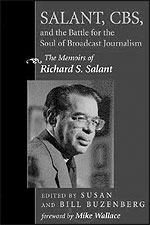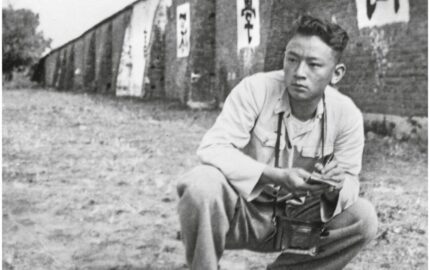Dick Salant, the CBS corporate lawyer whom Frank Stanton named president of his news division in 1961, was so wedded to his job that he watched the Cronkite evening news in his limousine every night while being driven home. Once he arrived there, he played back the ABC and NBC versions of the evening news and made notes of what he liked and disliked. The next morning he peppered his deputies with memos, comments, complaints and admonitions—so many of them that Gordon Manning, Vice President for News, said, “My God, he’s writing them faster than I can read them.”
By 1999 standards Salant was unbelievably high-minded and old-fashioned. He drew as sharp a line as he could between news and entertainment. For news shows he ruled against music and opening fanfare. He was a world-class grammarian with an overriding concern for content. Pictures were of secondary importance.
He bridled at any tendency to aim at the emotions rather than the mind. Salant subscribed to the Reithian BBC philosophy that it was radio and television’s stern duty to tell people what they ought to know. As he put it to one critic, “I feel strongly that it is a journalist’s function to tell people what they ought to know, and not take public opinion surveys to find out what is most interesting, titillating, and amusing in the way of news. It has always been the function of editors and journalists to choose those news stories which are most important, and the fact that many people may not be initially interested in them cannot deter us. I am afraid that is elitist, but it is the true profession of journalism.”
Salant spent much of his 16 years as head of CBS defending the troops. When various critics jumped on Walter Cronkite for “editorializing” in 1968 for declaring that the only way out of the Vietnam quagmire was to negotiate, Salant bent his rules and declared that “there are some extraordinary occasions when our senior correspondents should, on the basis of personal surveys and observations, be given permission to state conclusions.”
When Dan Rather’s removal from the White House beat to be one of the lead correspondents in “CBS Reports” was seen by some as a demotion, Salant said, somewhat extravagantly, that he had told Dan that any time he wanted to go back to the White House, he could do so. “As a matter of fact, as far as I am concerned, I would be delighted if he went back as President of the United States.”
He claimed to be “heartbroken” when the gruff and acerbic Hughes Rudd came a cropper on the “CBS Morning News.” Salant said he “loved” Howard K. Smith, but had to fire him for violating CBS policy against editorializing. Elsewhere in his book, Salant admits to a major mistake in bringing the egoistic David Schoenbrun home from Paris to head the CBS Washington bureau. Salant’s conclusion: “Management—the bureau chief’s job—and reporting should not be combined in a single person, particularly when the person has an insatiable appetite for power, for airtime, and visibility.” He came close to firing Dan Schorr for a number of reasons, but Schorr beat CBS to the punch by resigning. Salant concedes it “was a notable black mark on his watch” to hire Sally Quinn as co-anchor of the morning news. He felt that Quinn “could not make the adjustment to television,” and CBS let her go.
When CBS got into grievous trouble with Congress over their new documentary “The Selling of the Pentagon” and demanded the out-takes, Salant tucked the reels of film and other material in the trunk of his car to protect them from subpoena.
These anecdotes are a random sampling of many inside revelations in this memoir which is not strictly a memoir, but an edited compilation of 3000 pages of Salant’s recollections, memories and speeches. Before he died Salant told his family, “I can’t do it,” and stopped work on what he called “the world’s longest unfinished book on news.” Fortunately for the historical record of broadcast journalism, the Buzenbergs have managed to boil down Salant’s 40 pounds of memory to a trim 300, often fascinating, pages.
His legacy, as illuminated in this book, is large. Salant played a major role in expanding the evening news to half an hour. He shepherded many other news programs, such as “60 Minutes” and “Calendar.” His 16 years at the helm of CBS spanned cosmic news events—Watergate, the Civil Rights Movement, the assassination of President Kennedy, space exploration. Each of these was seminal reportage in an era when TV news came of age.
His most notable contribution was setting high standards and keeping the conscience of broadcast news. Newsmen who reported to him have no hesitancy in proclaiming him “the best boss we ever had.” He took as much pride in maintaining the integrity of the news as he did in restoring the Cronkite show to the top after the ascendancy of Huntley-Brinkley.
Salant was promised a consultancy after he took mandatory retirement from CBS at the age of 65 in 1979, but it never developed. He hated retirement and, somewhat warily, was persuaded to become Vice-Chairman of NBC. The atmosphere there proved uncongenial, and he soon decided that NBC was not a place where he could be useful. In 1983, still afraid to retire, he became President of the National News Council. His old network, CBS, supported the Council, but other big players, notably The New York Times, felt that the Council threatened the papers’ independence. When the Council folded in 1984 Salant ruefully concluded that he had “retired five years too late.”
That did not deter him from continuing as an apostle for better broadcast journalism. He took to the luncheon circuit to decry the intrusion of soft news and disappearance of serious-issue documentaries. On February 16, 1993 Salant gave a talk in Fairfield, Connecticut. His theme was the blurring of news and entertainment. He had begun to answer questions when, suddenly, he slumped to the floor with a fatal heart attack.
Salant is gone and so, increasingly, is the straightforward, no-nonsense style of reporting news on the air which he exemplified. The proliferation of magazine shows has inexorably changed the focus of the news divisions. Network news viewing is steadily going down. Every year brings smaller audiences. Ownership changes bring with them an erosion in standards. Foreign news and Washington coverage is shrinking.
The editors of this book write that Richard Salant’s life in broadcast journalism has come to symbolize the profession’s highest ideals. “Some day,” they conclude, “in a less profit-and-ratings-driven era, his enlightened blueprint for broadcast journalism will again point the way for others who know that the First Amendment is not just a license to make money but that it comes with enormous responsibility to serve the public.”
Let us all embrace this hope, but I wouldn’t bet the farm on it.
Ray Scherer was White House Correspondent for NBC News during the Truman, Eisenhower, Kennedy and Johnson years.
By 1999 standards Salant was unbelievably high-minded and old-fashioned. He drew as sharp a line as he could between news and entertainment. For news shows he ruled against music and opening fanfare. He was a world-class grammarian with an overriding concern for content. Pictures were of secondary importance.
He bridled at any tendency to aim at the emotions rather than the mind. Salant subscribed to the Reithian BBC philosophy that it was radio and television’s stern duty to tell people what they ought to know. As he put it to one critic, “I feel strongly that it is a journalist’s function to tell people what they ought to know, and not take public opinion surveys to find out what is most interesting, titillating, and amusing in the way of news. It has always been the function of editors and journalists to choose those news stories which are most important, and the fact that many people may not be initially interested in them cannot deter us. I am afraid that is elitist, but it is the true profession of journalism.”
Salant spent much of his 16 years as head of CBS defending the troops. When various critics jumped on Walter Cronkite for “editorializing” in 1968 for declaring that the only way out of the Vietnam quagmire was to negotiate, Salant bent his rules and declared that “there are some extraordinary occasions when our senior correspondents should, on the basis of personal surveys and observations, be given permission to state conclusions.”
When Dan Rather’s removal from the White House beat to be one of the lead correspondents in “CBS Reports” was seen by some as a demotion, Salant said, somewhat extravagantly, that he had told Dan that any time he wanted to go back to the White House, he could do so. “As a matter of fact, as far as I am concerned, I would be delighted if he went back as President of the United States.”
He claimed to be “heartbroken” when the gruff and acerbic Hughes Rudd came a cropper on the “CBS Morning News.” Salant said he “loved” Howard K. Smith, but had to fire him for violating CBS policy against editorializing. Elsewhere in his book, Salant admits to a major mistake in bringing the egoistic David Schoenbrun home from Paris to head the CBS Washington bureau. Salant’s conclusion: “Management—the bureau chief’s job—and reporting should not be combined in a single person, particularly when the person has an insatiable appetite for power, for airtime, and visibility.” He came close to firing Dan Schorr for a number of reasons, but Schorr beat CBS to the punch by resigning. Salant concedes it “was a notable black mark on his watch” to hire Sally Quinn as co-anchor of the morning news. He felt that Quinn “could not make the adjustment to television,” and CBS let her go.
When CBS got into grievous trouble with Congress over their new documentary “The Selling of the Pentagon” and demanded the out-takes, Salant tucked the reels of film and other material in the trunk of his car to protect them from subpoena.
These anecdotes are a random sampling of many inside revelations in this memoir which is not strictly a memoir, but an edited compilation of 3000 pages of Salant’s recollections, memories and speeches. Before he died Salant told his family, “I can’t do it,” and stopped work on what he called “the world’s longest unfinished book on news.” Fortunately for the historical record of broadcast journalism, the Buzenbergs have managed to boil down Salant’s 40 pounds of memory to a trim 300, often fascinating, pages.
His legacy, as illuminated in this book, is large. Salant played a major role in expanding the evening news to half an hour. He shepherded many other news programs, such as “60 Minutes” and “Calendar.” His 16 years at the helm of CBS spanned cosmic news events—Watergate, the Civil Rights Movement, the assassination of President Kennedy, space exploration. Each of these was seminal reportage in an era when TV news came of age.
His most notable contribution was setting high standards and keeping the conscience of broadcast news. Newsmen who reported to him have no hesitancy in proclaiming him “the best boss we ever had.” He took as much pride in maintaining the integrity of the news as he did in restoring the Cronkite show to the top after the ascendancy of Huntley-Brinkley.
Salant was promised a consultancy after he took mandatory retirement from CBS at the age of 65 in 1979, but it never developed. He hated retirement and, somewhat warily, was persuaded to become Vice-Chairman of NBC. The atmosphere there proved uncongenial, and he soon decided that NBC was not a place where he could be useful. In 1983, still afraid to retire, he became President of the National News Council. His old network, CBS, supported the Council, but other big players, notably The New York Times, felt that the Council threatened the papers’ independence. When the Council folded in 1984 Salant ruefully concluded that he had “retired five years too late.”
That did not deter him from continuing as an apostle for better broadcast journalism. He took to the luncheon circuit to decry the intrusion of soft news and disappearance of serious-issue documentaries. On February 16, 1993 Salant gave a talk in Fairfield, Connecticut. His theme was the blurring of news and entertainment. He had begun to answer questions when, suddenly, he slumped to the floor with a fatal heart attack.
Salant is gone and so, increasingly, is the straightforward, no-nonsense style of reporting news on the air which he exemplified. The proliferation of magazine shows has inexorably changed the focus of the news divisions. Network news viewing is steadily going down. Every year brings smaller audiences. Ownership changes bring with them an erosion in standards. Foreign news and Washington coverage is shrinking.
The editors of this book write that Richard Salant’s life in broadcast journalism has come to symbolize the profession’s highest ideals. “Some day,” they conclude, “in a less profit-and-ratings-driven era, his enlightened blueprint for broadcast journalism will again point the way for others who know that the First Amendment is not just a license to make money but that it comes with enormous responsibility to serve the public.”
Let us all embrace this hope, but I wouldn’t bet the farm on it.
Ray Scherer was White House Correspondent for NBC News during the Truman, Eisenhower, Kennedy and Johnson years.




